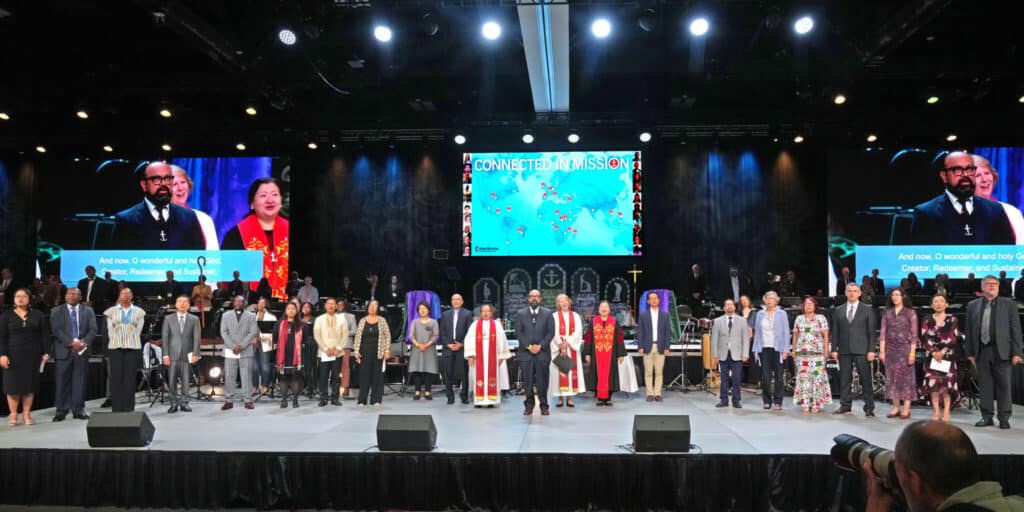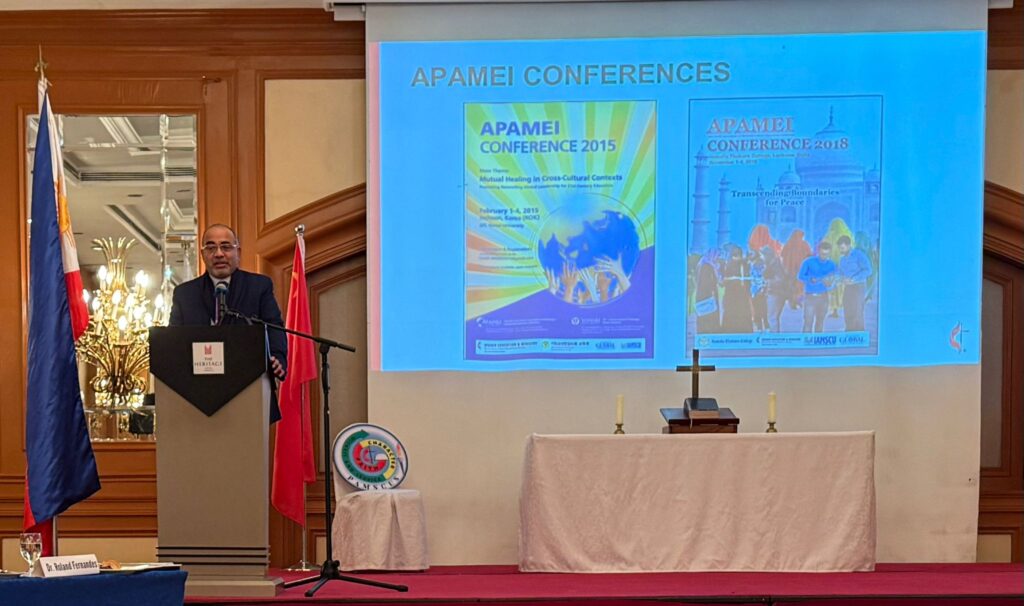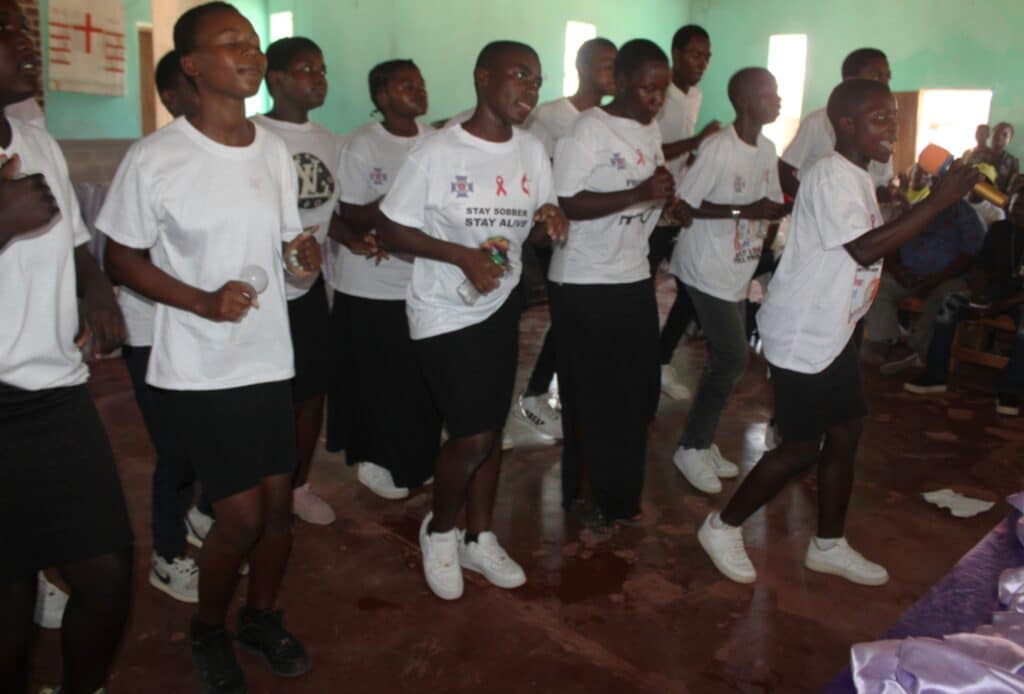ATLANTA – At the long-awaited 2020 General Conference of The United Methodist Church in Charlotte, North Carolina, April 23 – May 3, Global Ministries submitted 23 petitions for consideration by 765 worldwide delegates. Each petition passed with overwhelming majority in committee and was formally approved on consent calendars by full plenary action.
The passing of these petitions affirms and further supports Global Ministries and UMCOR’s mandate to work in partnership with congregations, conferences, organizations and individuals as they engage in God’s mission in their local contexts.
Areas of work within this body of legislation include, but are not limited to, religious freedom; peace and justice; global migration; hunger and poverty; disaster recovery; HIV and AIDS; Deaf and Hard of Hearing ministries; and racial and ethnic ministries.
The “Religious Freedom: Grounded in Love” resolution was approved to become part of the United Methodist Book of Resolutions and calls for an end to violence and persecution of others because of their religious beliefs or affiliations. The passing of this legislation invites the global church into the hard work of dialogue, listening and sharing with different faith communities, and also to acts of reconciliation across boundaries that divide our own Christian communities.
The Asian American Language Plan, Korean Ministry Plan and Pacific Islander Plan will remain under the administration of Global Ministries for the next quadrennium. The National Plan for Hispanic/Latino Ministries requested a transfer to the General Commission on Religion and Race, which was approved.
During General Conference, Global Ministries also celebrated 200 years of mission and marked several milestones: 5 million children reached through the Abundant Health Initiative; 80 years of UMCOR; commissioning of new United Methodist missionaries; and strengthening of partnerships in Latin America and the Caribbean.
The General Conference also approved many historic actions that significantly impact the future of the church and consequently its mission:
Adoption of worldwide regionalization
Delegates approved legislation that would restructure the denomination to be more contextual in different regions served by the church (upon ratification of a constitutional amendment by at least two-thirds of annual conference voters). The current central conferences and the U.S. would become regional conferences, with the same authority to pass legislation for greater missional impact.
Decrease in denominational budget and annual conference apportionments
A 2025-2028 budget of $373.4 million was approved and is 41% smaller than the 2016 General Conference budget. Annual conferences will be asked to pay less in apportionments in an effort to balance funding important connectional ministries through the general church budget and supporting the local church during financial challenges due to the pandemic and disaffiliation.
Removal of restrictive language related to LGBTQ people
The General Conference voted by overwhelming majorities to remove from the United Methodist Book of Discipline discriminatory language and bans related to ministry by, with and for “self-avowed practicing” gay and lesbian people.
Adoption of Revised Social Principles
Delegates approved the first overhaul of the denomination’s Social Principles in nearly 50 years. In addition to the language changes regarding human sexuality and inclusiveness, the Social Principles address the importance of advocating for human dignity and combating racism and other threats, caring for creation and the environment, standing against social ills, and supporting healthy community in all its forms.
Changes in numbers of bishops, increased diversity in leadership
Two bishops will be added for Africa, for a total of 15, and the number of U.S. bishops was lowered from 39 to 32. Bishop Tracy S. Malone, resident bishop of the East Ohio Conference, became the first Black female president of the Council of Bishops. Bishop David Wilson and Bishop Carlo Rapanut, both former members of Global Ministries Board of Directors, marked historic “firsts” as Native American and Filipino American bishops to preside over General Conference.
Full communion with the Episcopal Church
Upon affirmation of the agreement by the Episcopal Church, the two denominations will strengthen ties and deepen ecumenical relations. Full communion will bring the recognition of each other’s sacraments and ordination of clergy, among other shared connections.
Global Ministries celebrates the worldwide regionalization plan and welcomes the inclusion of all people in the life of the church, while also recognizing and respecting the cultural and contextual diversity of the UMC’s worldwide connection. With the adoption of regionalization, Global Ministries will continue to embody mutuality in mission with its partners and be guided by the unique cultural contexts in which they serve. In the long-term, “we will continue to adapt to the changing needs of a restructured and more regional church and deepen our commitment to work alongside partners across various missional landscapes,” said Roland Fernandes, general secretary of Global Ministries and UMCOR.
This commitment remains strong even as Global Ministries navigates new financial realities. The General Conference approved a 52% budget reduction of the World Service Fund’s contribution to the agency’s work. Over the last five years, Global Ministries has made hard, yet strategic decisions that have created a stable short term financial position. But this cut is too large to not impact the scale of global mission and ministry in the long term.
“Even though sustaining our work will become more difficult, we are already identifying and living into collaborative ways of working that will help ease this big shift in funding,” said Fernandes. “As we trust in the leading of God’s spirit, I am optimistic and hopeful about the future of the church. We are entering a new mission age.”
To read about more major actions taken at General Conference, visit this legislative recap page.
Sara Logeman is the senior manager of content and marketing for Global Ministries and UMCOR. United Methodist Communications contributed to this reporting.
Planned Giving
Leave a legacy of hope and healing through a planned or estate gift.
Support an Advance Project or MissionaryFind a missionary or project that matches your passion and interest.
Special Sunday Offerings
[Body lorem ipsum dolor sit amet, consectetur adipiscing elit nunc vulputate libero.]
Looking for another way to give? View all ways to give




